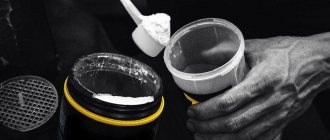Hello, dear readers of my blog! If you are serious about your own health, I suggest you plunge into the world of organic compounds together. Today I will talk about amino acids in food products, a table of which will be attached for convenience in the article. We’ll also talk about the required daily intake for a person.
We recommend reading: Smith Shoulder Press
What are BCAA's?
There are 20 amino acids in the body which form thousands of different protein chains. Nine of them are classified as essential amino acids , which means that these amino acids cannot be synthesized on their own, but rather are obtained from food or dietary supplements. Three of these nine amino acids are called BCAA . [3]
The abbreviation BCAA comes from the English Branched Chain Amino Acids , which means branched chain amino acids. The term BCAA refers to three essential amino acids, namely leucine, isoleucine and valine . They differ from other amino acids in that they are metabolized not in the liver, but in the muscles. [1]
They also differ in their properties [33]:
- Leucine increases protein synthesis and helps build and repair muscles. It also supports insulin regulation and is one of two amino acids that cannot be converted into sugar.
- isoleucine regulates glucose consumption, allowing energy to be stored in muscles rather than in fat cells
- valine improves brain function, reduces fatigue and serves to prevent protein breakdown
BCAAs are responsible for many tasks in the body , such as protein synthesis, energy production, the formation of other amino acids such as alanine and glutamine, or the regulation of leptin. [2] We will tell you everything about the properties of branched chain amino acids in the following lines of the article.
What are BCAA or Branched Chain Amino Acids?
Now we will talk more specifically about the topic stated in the title, namely about branched chain amino acids, or BCAA, in particular, these are three amino acids - valine, leucine and isoleucine. These are essential amino acids. What does it mean? This means that you need to take extra care of them in your diet. Why? Because your body does not produce them on its own, as described above.
As mentioned, bcaa amino acids are required in significant quantities because they are protein building blocks and are responsible for many energy-related functions during and after exercise. These amino acids are not produced by the body; we get them from food. When we exercise, their levels in the body gradually decrease. By adding supplements to your diet, you can prevent your levels from dropping during exercise. You need quite a lot, but not excessively.
It is important to take BCAA on a daily basis. Of course, this can be done with the help of nutritional supplements, but there are also natural ways to obtain them, for example, they are found in many foods, but we will get to that later. Meat and eggs are excellent sources of BCAA, unless your workouts are very strenuous and irregular. In general, supplements are only needed when you have a lack of protein intake. People with low physical activity and sufficient protein intake, about 1–1.5 grams/kg of body weight per day, do not need them.
Sources of BCAA
BCAA is found in foods, proteins or dietary supplements . BCAA is available in powder, BCAA energy drink or tablet form.
Natural sources of BCAA are high protein , especially meat, whey, fish, eggs and dairy products. We have prepared a table for you with the amount of BCAA contained in food: [3]
| Product | Quantity | BCAAs |
| Beef | 100 g | 6.8 g |
| Chicken breast | 100 g | 5.9 g |
| Whey Protein | 1 measuring spoon | 5.5 g |
| Soy protein | 1 measuring spoon | 5.5 g |
| Canned tuna | 100 g | 5.2 g |
| Salmon | 100 g | 4.9 g |
| Turkey breast | 100 g | 4.6 g |
| Eggs | 2 pcs | 3.3 g |
| Parmesan | 50 g | 4.5 g |
| Greek yogurt | 140 g | 2 g |
What are amino acids?
In the most general sense, protein for muscle tissue is a building material. Bcaa amino acids also play a critical role in physiological processes related to strength, muscle gain, brain function, well-being, energy and recovery. But that's not all. They are also important for weight loss, especially when there is a need to burn fat and maintain muscle.
Any protein, aka protein, consists of a set of amino acids (the type of protein depends on which amino acid chains are present in it) and many natural products with a high protein content. It is common to think that any protein source consists of essentially the same thing, but this is not true. For example, the elements in meat, yogurt, chicken, crumbly cottage cheese, fish and other products differ from each other. This is because each of these protein sources has a different type and amount of amino acids. And they, in turn, play a vital role in restoring the body and creating new muscle tissue.
There are 2 types of amino acids:
- replaceable;
- irreplaceable.
The body can produce nonessential amino acids independently from other amino acids. They are responsible for many functions: removing toxins, helping with proper brain function, synthesizing blood cells, providing the body with antioxidants, strengthening the immune system, and regulating energy levels. These include: arginine, glutamic acid, glycine, aspartic acid, histidine, serine, cysteine, tyrosine, alanine, proline. Without the right levels of amino acids, you get sick easily, feel sluggish, and suffer from a variety of other side effects.
The body is not able to synthesize essential amino acids on its own; they must come from outside along with protein foods. These include: valine, methionine, leucine, isoleucine, phenylalanine, lysine, tryptophan, threonine.
Especially when you train intensely, your body needs additional protein with a complete amino acid composition.
Recommended daily dose of BCAA
The standard dose of isoleucine is 48 to 72 mg per kilogram of body weight. The recommended dose of leucine is 2 to 10 grams. This equates to approximately 20g of combined BCAA amino acids with a balanced ratio of leucine and isoleucine per day. [39]
One dose of a BCAA dietary supplement should contain 5 to 10 grams , depending on the timing.
Ideally, BCAA's should be taken 30-60 minutes before exercise and then immediately after exercise. At the same time, it is recommended to mix BCAA with water and take it during exercise in order to have enough energy and suppress fatigue at the same time. [39] [40]
Safety and side effects
Taking BCAA supplements is safe for most people and does not carry the risk of side effects.
The effects of overdose have not yet been studied, but it is reliably known that you can safely take up to 35 grams of BCAA per day.
However, there are contraindications - congenital diseases, in which the intake of BCAA should be limited. The body of such people cannot properly process the components of the drug.
Getting 15-25 grams of BCAAs through diet or supplementation is a safe amount for many people. But those who are allergic to them or have congenital problems should not take them.
BCAA can be taken with creatine and will not cause any side effects. But it is recommended to consume some kind of carbohydrate snack along with them, since both supplements are designed to maximize muscle strength, and this requires energy. You can consume the same amount of creatine as you normally consume.
The same is true for mass gainers—carbs are needed by the body if you're trying to build muscle. Take amino acids in the morning and during training. Take the gainer one and a half hours before training. This will provide you with the necessary energy, speed up muscle recovery and ensure an increase in muscle mass.
And you can and should consume protein powder if you want to build muscle. Obviously, BCAA is a muscle growth stimulator. But in order for muscles to grow, you also need raw materials, so you should add protein powder to your diet, as well as protein foods. In addition, for the BCAAs themselves to work correctly, the body must have enough other essential amino acids. Therefore, when purchasing protein powder, you should pay attention to its quality.
Ratio of amino acids in BCAA
If you are choosing a BCAA supplement, you may be confused by the different amino acid ratios. The most commonly used ratio is 2:1:1 , which is two parts leucine and one part isoleucine and valine. You can also find BCAA in the ratio of 4:1:1, 8:1:1 and 10:1:1. Excessive doses of leucine are justified by its positive effect on muscle building. However, the fact is that 8:1:1 and 10:1:1 ratio production is simply cheaper.
As for the 2:1:1 ratio, this is the most typical BCAA regimen . A 4:1:1 ratio was also looked at by the study and the results showed an increase in protein synthesis of over 30% . [33] Therefore, we recommend using BCAA supplements in a ratio of 2:1:1 and 4:1:1.
What are the benefits of these amino acids?
The benefits of branched chain amino acids are not limited to the world of health and fitness, they are important in many different aspects of life beyond active sports. They are used to treat certain brain diseases, Lou Gehrig's disease, kidney disorders, and are prescribed for cancer patients, the elderly, and those who must endure bed rest. However, their functions are far from limited to caring for the sick and elderly.
Do not misunderstand me. Why do healthy people take BCAA? They use them to enhance concentration and combat fatigue. Athletes also use them. How? BCAAs reduce the chance of muscle tearing and improve athletic performance.
Exercise increases serotonin levels. This is associated with the onset of fatigue. This is where taking BCAA comes into play. Why? They are believed to be able to reduce serotonin levels. As a result, it removes the fatigue factor and improves athletic performance. Many researchers share this opinion. There are, however, works that tend to refute this. They suggest that the influence of BCAA is overestimated and amino acids of this kind are useless.
So who to believe? What are the benefits and harms of BCAA?
Let's take a look at the facts. BCAAs are processed primarily in skeletal muscles. Other amino acids are processed by the liver. As a result, some people believe that they should take BCAAs during exercise. Of course, this supplement is often promoted as a means to reduce muscle pain, repair muscles, and improve speed and strength performance. There is evidence to support the view that what BCAAs do before and after workouts is to have a positive effect on broken down muscle tissue and increase protein synthesis to build muscle mass.
People take essential amino acids because they can enhance protein synthesis, which in turn will affect muscle growth over time. They are also used to reduce fatigue during training for both beginners and experienced athletes. The amino acid leucine is very important for muscle protein synthesis. Isoleucine is responsible for the absorption of glucose into cells. Research is still underway to determine valine's place among BCAA supplements.
In addition, a decrease in the amount of these substances causes an influx of tryptophan into the brain. And this causes the production of serotonin, which, as I mentioned, in turn makes you feel tired.











